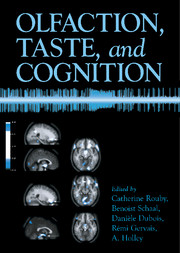Book contents
- Frontmatter
- Contents
- Contributors
- Preface
- Acknowledgments
- A Tribute to Edmond Roudnitska
- OLFACTION, TASTE, AND COGNITION
- Section 1 A Specific Type of Cognition
- 1 Olfaction and Cognition: A Philosophical and Psychoanalytic View
- 2 Cognitive Aspects of Olfaction in Perfumer Practice
- 3 The Specific Characteristics of the Sense of Smell
- Section 2 Knowledge and Languages
- Section 3 Emotion
- Section 4 Memory
- Section 5 Neural Bases
- Section 6 Individual Variations
- Index
- References
1 - Olfaction and Cognition: A Philosophical and Psychoanalytic View
Published online by Cambridge University Press: 21 September 2009
- Frontmatter
- Contents
- Contributors
- Preface
- Acknowledgments
- A Tribute to Edmond Roudnitska
- OLFACTION, TASTE, AND COGNITION
- Section 1 A Specific Type of Cognition
- 1 Olfaction and Cognition: A Philosophical and Psychoanalytic View
- 2 Cognitive Aspects of Olfaction in Perfumer Practice
- 3 The Specific Characteristics of the Sense of Smell
- Section 2 Knowledge and Languages
- Section 3 Emotion
- Section 4 Memory
- Section 5 Neural Bases
- Section 6 Individual Variations
- Index
- References
Summary
“Are you not ashamed to believe that the nose is a means to find God?” wrote Saint Augustine (1873) in his refutation of the Manichaeans in 389 C.E. Fifteen centuries later, Sigmund Freud, addressing the members of the Vienna Psychoanalytical Society, stated that “the organic sublimation of the sense of smell is a factor of civilisation” (Freud, 1978, p. 318).
These peremptory opinions expressed by the Christian philosopher and by the founder of psychoanalysis offer little support for any investigation into the sense of smell as a tool for knowledge. Furthermore, they are typical of an attitude widely held by both philosophers (Le Guérer, 1987) and psychoanalysts (Le Guérer, 1996). There are many possible explanations for the mistrust – indeed, the rejection – with which both groups have treated this sense, but all of them converge on its animal nature.
Philosophers have often slighted and underestimated the sense of smell. Plato (1961) and Aristotle (1959) maintained that the pleasures it provided were less pure, less noble, than those offered by sight and hearing. Aristotle also found it lacking in finesse and discernment. Descartes (1953) regarded it as vulgar, and Kant (1978) thought it a coarse sense and one best left undeveloped, leading as it did to more unpleasant experiences than pleasant ones. Schopenhauer (1966) considered it an inferior sense; Hegel (1979) eliminated it from his aesthetics.
Information
- Type
- Chapter
- Information
- Olfaction, Taste, and Cognition , pp. 3 - 15Publisher: Cambridge University PressPrint publication year: 2002
References
Accessibility standard: Unknown
Why this information is here
This section outlines the accessibility features of this content - including support for screen readers, full keyboard navigation and high-contrast display options. This may not be relevant for you.Accessibility Information
- 31
- Cited by
